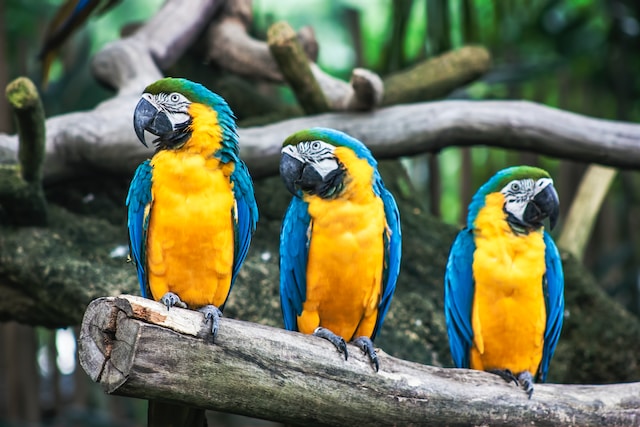Parrots, with their vibrant colors and charismatic personalities, make delightful and intelligent companions. However, providing proper care for these magnificent birds requires knowledge and commitment. In this article, we present Parrot Care 101, offering essential tips to ensure the well-being, health, and happiness of your feathered friend.
- A Spacious and Stimulating Environment: Parrots are highly active birds that require ample space to move and exercise. Invest in a spacious cage that allows your parrot to spread its wings and move around comfortably. Provide plenty of toys, perches of different textures and sizes, and rotate them regularly to keep your parrot mentally engaged and physically active.
- A Nutritious and Varied Diet: Proper nutrition is essential for the overall health of your parrot. Offer a balanced diet that includes a variety of fresh fruits, vegetables, grains, and high-quality commercial pelleted food formulated specifically for parrots. Avoid feeding them foods that are toxic to birds, such as chocolate, caffeine, alcohol, and avocado. Consult with an avian veterinarian for specific dietary recommendations based on your parrot’s species and individual needs.
- Hydration and Clean Water: Fresh, clean water should be available to your parrot at all times. Change the water daily and ensure that the water dish is easily accessible. Some parrot species enjoy bathing, so consider providing a shallow dish of water for them to splash around in. Regular bathing helps to keep their feathers clean and in good condition.
- Mental Stimulation and Social Interaction: Parrots are highly intelligent creatures that require mental stimulation and social interaction. Spend quality time interacting with your parrot through talking, playing, and training sessions. Engage their minds with puzzle toys, foraging activities, and interactive games. Parrots thrive when they feel connected to their human caregivers, so devote time to build a strong bond with your feathered companion.
- Veterinary Care and Regular Check-ups: Maintaining your parrot’s health requires regular veterinary check-ups. Find an avian veterinarian with expertise in treating parrots and schedule routine wellness exams for your bird. This allows for early detection of any potential health issues and ensures appropriate vaccinations, as well as necessary blood work or fecal tests.
- A Safe and Enriching Environment: Parrots are curious creatures and have a natural inclination to explore their surroundings. Make sure your home is parrot-proofed to prevent accidents and exposure to hazardous substances or plants. Avoid using toxic cleaning products and keep potentially harmful objects out of reach. Provide safe, non-toxic toys and supervised out-of-cage time for your parrot to exercise and explore under your watchful eye.
- Regular Exercise and Flight: Parrots are built to fly and need opportunities for physical exercise. Whenever possible, allow your parrot to engage in supervised flight within a safe and controlled environment. This helps maintain their muscle tone and overall well-being. Regular exercise prevents obesity and allows them to exhibit natural behaviors.
- Respect Their Sleep Patterns: Parrots require adequate sleep for their overall health and well-being. Provide a quiet and dark environment for your parrot to rest, ensuring they receive 10-12 hours of uninterrupted sleep each night. Covering their cage with a breathable cloth can help create a suitable sleeping environment.
By following these Parrot Care 101 guidelines, you can provide your feathered friend with a happy, healthy, and fulfilling life. Remember, parrots are long-lived companions, and their care requires commitment, patience, and a deep understanding of their unique needs. The rewards of a well-cared-for parrot are immeasurable.




